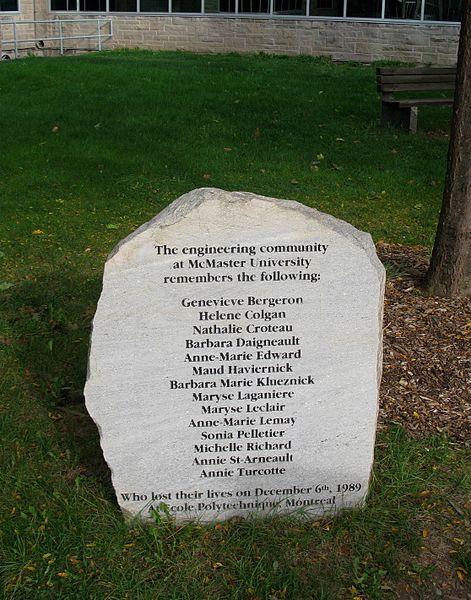École Polytechnique massacre – a day of horror remembered
The École Polytechnique massacre on December 6th, 1989, has to be one of the worst days in Canadian history. On that day, a man walked into the engineering school in Montreal, armed with a Ruger Mini-14 and a hunting knife. This lead to the worst mass shooting in Canadian history, to date.
 Gamil Gharbi, aka Marc Lépine, was that man. The son of a man who did not consider women the equal of men, almost certainly for Middle Eastern religious reasons, he, too, had a problem with women. He particularly hated feminists.
Gamil Gharbi, aka Marc Lépine, was that man. The son of a man who did not consider women the equal of men, almost certainly for Middle Eastern religious reasons, he, too, had a problem with women. He particularly hated feminists.
His goal on that awful day, according to his manifesto, was to kill feminists. While he did not succeed in killing certain people he particularly named, he still left an awful carnage.
By the time he was finished killing, Lépine had shot to death thirteen women. Another he killed with his hunting knife, stabbing her three times. She was the daughter of the police officer who discovered her. This brought the total number of women he slaughtered to 14.
He shot and wounded another ten women and four men. Finally, after his fatal knife attack, he turned his rifle on himself and committed suicide. In fact, as later discovered in a letter in the dead killer’s pocket, suicide was his intent from the outset.
The authorities and governments at all levels very carefully contained information on the case as much as they could. The thing they wanted to avoid, above all else, was turning a murderer into some kind of warped cult hero.
At the same time, the memory of the women who died so young has been kept alive. Their deaths at the hands of an angry young man, simply because they were women, must never be forgotten.
One of the saddest things about this terrible event is the way it has been politicized. Even today, so many years later, the real reasons behind the attack are carefully downplayed and avoided by the media, while self-serving politicians are using this tragedy to advance their patently dishonest gun-control ambitions.
Let us not be so heartless! Remember the names. These were real people with families, with real lives, real ambitions, and real desires of their own, who were cut down by someone who hated them due mainly (it would seem) because of the hatred he was raised with. Events such as the École Polytechnique massacre are some of the worst events in history, because they are directed at an entire group out of hatred for that group, rather than at an individual for any other reason.
Hate speech is illegal in Canada, in spite of the fact that freedom of speech is protected by the constitution. But we have noticed many times already that those who hate enough to kill often make a lot of posts about their murderous intent and dangerous thinking on social media platforms such as Facebook and Twitter, long before they ever act on it.
This kind of online diatribes can cause untold harm if it garners any kind of following. But if intelligence and law enforcement agencies were to watch for such rhetoric, which they are very capable of doing, perhaps at least a few tragedies could be prevented in our more modern, digital age.
But if we want to prevent such tragedies as the École Polytechnique massacre, the number one thing we can do is to encourage people to raise their own children without the same hatred. That is a most difficult, yet worthy goal. Love cannot be bought. It must be demonstrated and given freely, without restrictions, without conditions, with no expectation of reciprocation. There is no other way.
